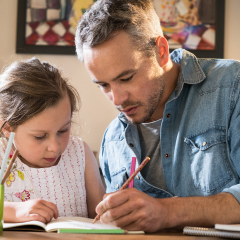Technology has come a long way in recent years. Gone are the days when students would visit the library to obtain information for a school project or piece of homework, furiously scribbling notes or photocopying pages from a book. The introduction of the internet gave students instant access to data and information relating to any topic and subject, all at a click of a button. However, last year saw technology move on one step further…
Chat GPT, that launched at the start of the academic year in 2022, is the latest AI platform designed to generate ‘bot’ written content that mimics human writing abilities. This latest technological advancement can produce high-quality essays, stories, research papers and even poetry. I know what you are all thinking, this would save hours of time spent helping the kids with their homework. But could this new tech system pose a threat to our current education system and hinder the learning process, or could it in fact help students and teachers in their learning journey?
As market leaders in the education sector, we have drawn on the experience from within our team that is made up largely of ex-headteachers and industry experts, to create a blog that looks at how the new AI platform might affect students and schools.
Firstly however, let us explain what Chat GPT is and how it works.
What is Chat GPT?
Chat GPT is a chatbot that was developed by artificial intelligence research company OpenAI. It has a range of features and functions which include, being able to write essays (as aforementioned), solve maths equations, translate languages, answer questions, fix and debug code and predict the lottery numbers – ok, not quite that last one, but you get the gist, Chat GPT can do a lot of things. The platform offers a lot of support and has the potential to save students time by simplifying learning.
How does it work?
Like most AIs, Chat GPT pulls information and data from the internet. It has a chat-based interface which allows the ‘chat bot’ to respond to questions asked of it, with a filter that rejects certain requests (for obvious reasons). It is quick, easy to use and free. Unlike normal web chat functions which often rely on automated and pre-programmed responses, Chat GPT tailors it’s answers like how a real person would.
To Help or to Hinder, that is the question?
Sounds great right?!
Let’s look at how this could both positively and negatively impact students and schools:
Students: The advantages
- In a nutshell, Chat GPT could allow students to produce top notch homework every time. The quality of output from Chat GPT is very high and reads as if a real human has created it. A student is able to ‘plug-in’ prompts to the programme relating to all matter of subjects, with great work in cohesive paragraphs produced as a result.
- What could normally take a student hours and days of hard work to put together, Chat GPT can create in just a few minutes. This will alleviate the need to come up with age old excuses such as “the dog ate my homework” to buy more time.
- Chat GPT could ensure that grammar, spelling and punctuation is spot on, as well as structure sentences, paragraphs and chapters as they should be written.
Students: The disadvantages
- This latest technology could lead to inequalities in the classroom, and whilst it is a nice notion to think that every student could be over-achieving in their English homework or coursework – the disparity between classroom and homebased competences would no doubt become apparent.
- Whilst Chat GPT has proven to produce high-level quality content, it cannot refer to specific in-class discussions. Chat GPT draws on data and information from the internet, rather than teacher specific subject material.
- It doesn’t provide the satisfaction you get that comes from producing your own well written piece of work.
Schools: The advantages
- A knee jerk reaction would be to assume there are very few benefits this AI software can bring to the classroom, other than every student producing an A* piece work that could artificially improve grades.
- Advanced technologies could be used to enhance teaching practices, provide new learning opportunities and improve the accessibility of education for all.
- It could lead to the way students are assessed and graded in the future.
- It could be used as an additional tool to help build curriculums and provide teachers with an additional research resource.
Schools: The disadvantages
- Chat GPT is effectively plagiarism and may hinder the learning process.
- It may be hard to determine true levels of attainment with the new ‘chat bot’ platform. However, teachers ultimately know their students and their abilities and would likely be able to spot a change in writing style if a student was to use Chat GPT.
- The system can generate textbook content but does not provide students with any level of understanding, learning or rationale to what is being written as provided by teaching staff in the classroom.
Expert Opinions
According to an article written by itvNEWS recently, Dr Chindu Sreedharan, an Associate Professor in Journalism and Communications at Bournemouth University, shared a view that education providers should embrace new software, including Chat GPT, as a way of helping students learn.
Dr Chindu Sreedharan said:
“Individuals may develop better writing practices by analysing how the AI structures responses, while others could view it as a more interactive way of researching topics because it mimics having a human conversation”.
Whilst Sarah Hannafin, Senior Policy Advisor at the National Association of Headteachers, said: “There are so few GCSE or A level qualifications which have any non-exam assessment – and for those that do it is mostly practical. It is therefore highly unlikely any student would be able to use this and for it be counted towards a qualification.”
For now, Chat GPT is here to stay and is something schools may need to monitor going into 2023.
As matter experts in the education sector, it’s great to be able to discuss challenges currently facing our industry. If you or your school have come across Chat GPT or if it’s something you are currently discussing with your colleagues in the staffroom, we’d love to hear from you.
Similarly, get in touch to talk to one of our team of experts to discuss other challenges you are currently facing in your establishment, we may be able to provide you with a solution.







